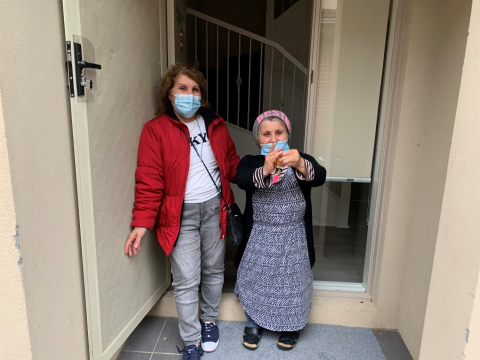Assistance for Syrian Sisters

This is a story of two of our Home at Last clients, sisters, Khanma, 63, and Rishwina, 60, from Assyrian background and came to Australia from Syria as refugees. They have very limited English therefore we used an Assyrian interpreter. They have been living in a privately rented property since arriving in Australia, assisted by the Refugee Settlement Program.
Khanma and Rishwina are both on Centrelink Jobseeker Allowance which does not cover the cost of their essentials. They had been paying almost 75 percent of their job seeker allowance to cover their rent which left them with very little amount income for other living expenses. They were referred to HAAG, to the Home At last program, for urgent housing assistance.
Our initial intake assessment and support workers encountered difficulties communicating with Khanma and Rishwina. Even with an interpreter on the telephone line, communication was a major barrier in assessing their needs and developing a case plan to identify actions to address their needs. Khanma and Rishwina were so unfamiliar with all of the processes including how to communicate with an interpreter on the telephone, what a housing assessment involved, what was the job of an Intake worker, who you could trust, reading application forms, and so on. These are just some of the many barriers people from a Culturally and Linguistically Diverse Background experience when they need assistance from the community sector.
We decided to seek assistance from our HAAG CALD Community Liaison Volunteer, Vivian, who played a significant role in overcoming the systemic barriers Khanma and Rishwina experienced in accessing housing services. Vivian and I conducted several home visits until we were sure that they were informed appropriately enough to identify their needs and work with us to develop an action plan. Vivian was also very influential in assisting Khanma and Rishwina in establishing a rapport with myself and other support workers involved.
We were very clear how urgent Khanma and Rishwina’s housing need were, however, due to renting privately and being assisted with bond payment form the Department, they unfortunately did not qualify on the Victorian Housing Register - Homeless with Support category. I therefore began approaching some social housing providers on a regular basis and advocated on their behalf. I stressed, how both Khanma and Rishwina, urgently needed appropriate and affordable housing to achieve their full potential and re-engage with their new lives here in Melbourne. I also pointed out how their housing situation causing them severe anxiety and stress, in particular, the worry of not being able to get any affordable and appropriate housing, plus the possibility of becoming homeless.
In the end I secured a property offer for them, a brand-new town house, in a suburb of their preference from the Women’s Housing Limited. The sign-up process also took quite a few telephone calls with an interpreter, a few extra home visits, but we did not mind how long it would take as we wanted to make sure they were happy with the outcome. Khanma and Rishina moved into their new town house and are only paying 25 percent of their income and remain eligible for rent assistance.
This is a great outcome for Khanma and Rishwina like so many other HAAG clients.
Working with Khanma and Elisha reminded me how privileged I am working for an organisation which values diversity and implements/reviews cultural inclusion strategies and puts such an importance to remove any such barriers to ensure our organisation is accessible across cultural boundaries. We are also so very grateful to Vivian and all the HAAG CALD Community Liaison Volunteers who played a significant role in overcoming the systemic barriers that the various CALD communities experience in accessing housing services here in Melbourne.
Melis Cevik
HAL Outreach Worker


 "There is nothing like staying at home for real comfort."
"There is nothing like staying at home for real comfort."